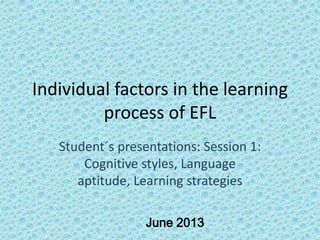
Individual factors students´presentation
- 1. Individual factors in the learning process of EFL Student´s presentations: Session 1: Cognitive styles, Language aptitude, Learning strategies June 2013
- 2. COGNITIVE STYLE COURSE: INDIVIDUAL FACTORS IN THE LEARNER’S DEVELOPMENT Enrique Rojas Olenka Nunura Karen Meza
- 3. WHAT IS COGNITIVE STYLE? • It refers to the matter in which the learner: – Perceives – Monitors – Conceptualises; and – Recalls linguistic information
- 4. VARIABLES • Reflective –impulsive thinking • Broad –narrow categorising • Skeletonising –embroidering • Belief congruence- contradiction
- 5. Witkin and the GET • Born: 2 August 1916 Died: 8 July 1979) • American psychologist, specialized in the spheres of cognitive psychology and learning psychology. • Pioneer of the theory of cognitive styles and learning styles. • GET stands for Group Embedded Test
- 6. Are you field dependent or field independent? 1. Do you spend less than three seconds watching yourself in a mirror? YES – NO 2. On your birthday, do you like having a party with all your friends? YES – NO 3. When you read a text or article do you like to comment about it with others? YES – NO 4. Are you concerned if you don’t have any likes on a picture you’ve posted in your facebook account ? YES- NO 5. Do you feel you learn better when working in groups? YES -NO
- 7. ANSWERS • More than 3 Yes: You are field dependent • More than 3 No: You are field independent • Only Yes: Extremely dependent. • Only No: Extremely independent.
- 8. SOCIAL CHARACTERISTICS OF THE FIELD DEPENDENT • Person oriented • Interested in other people • Sensitive to other people • Gregarious SOCIAL CHARACTERISTICS OF THE FIELD INDEPENDENT • More impersonal • Detached • Less sensitive • More aloof • Cerebral and object oriented
- 9. Field dependent – Field independent • Personal Orientation • Impersonal orientation • Analytic • Holistic • Socially sensitive • Not so socially aware • FD • FI • FI • FD • FD • FI
- 10. Criticism • William and Burden (1997): “… There is no such thing as ‘intelligence’ or ‘field dependence’ or ‘motivation’ but it can sometimes be convenient to treat such entities as if they do exist so that we can construct tests to measure them…’
- 13. To what extent cognitive style of learning style affects the success (or otherwise) of learning a foreign language? • The studies are not conclusive
- 14. CONCLUSIONS • There is no relation between cognitive styles and academic achievement. • Teachers should be aware of the different cognitive styles to guide students better. • Teachers should try to accomodate the cognitive styles through varying ways of instructions. • Factors such as cultural background, age, sex and level of education seem to influence the style the learner develops.
- 15. Presented by Liliana Melendez and Gerard Cooper
- 16. Learning a second language is a complex process, which consists of several factors.
- 17. Skehan (1989) mentioned five variables among which the independent ones are: Teaching Learner Context The learner variable consists of Individual factors: Cognitive Affective Physical and Psychological
- 18. Among the Cognitive factors, intelligence, language aptitude, cognitive styles, and learning strategies must be accounted for.
- 19. Skehan states that language aptitude is the most consistent predictor of success in language learning; therefore, it is an important factor which should be developed.
- 20. Can language aptitude be developed?
- 21. Even though Krashen says that language aptitude is not connected to formal instruction, Skehan believes that language aptitude includes both. The way to develop language aptitude is by means of adequate instruction, individual learning, and taking into consideration learner characteristics and skills.
- 22. Presented by Karina Febres and Mirko Manfredi
- 23. Definition Approaches or techniques learners use to try to learn an L2. They can be behavioral, mental and typically problem-oriented.
- 24. Characteristics Contributes to the main goal: Communicative competence. Allows learners to become autonomous. Problem oriented. Not always observable and Often conscious. Can be taught- strategy training. Flexible
- 25. Typology COGNITIVE Generalizing, making comparison between languages, note taking, practicing, analyzing, reasoning.
- 26. MEMORY Techniques which help the learner store and retrieve the stored information when necessary.
- 27. COMPENSATION Behaviours used to compensate for missing knowledge such as: circumlocution, avoidance, gu essing while listening or reading.
- 28. METACOGNITIVE Arranging and planning learning. Evaluating learning. Advance organizers.
- 29. SOCIAL Counting on friends for help. Participating in group conversations while pretending real understanding. Questioning and cooperating with others. Empathizing with others.
- 30. AFFECTIVE Self reinforcement. Lowering one’s anxiety. Positive self talk. Talking one’s emotional temperature.
- 31. COMMUNICATION Manchón Ruiz (1985) Based on L1: Literal translations, loans and foreignisms. Based on L2 or interlanguage: formation of new words and paraphrasing.
